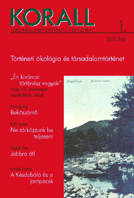Értékek, értékrendi változások Magyarországon 1945 és 1990 között
Values and their changes in Hungary between 1945 and 1990
Author(s): Tamás BeluszkySubject(s): Social Sciences
Published by: KORALL Társadalomtörténeti Egyesület
Keywords: Social history; Hungary; 20th century; socialist society; social values; individualism; research of values; Rokeach test; Elemér Hankiss
Summary/Abstract: Author summarises the changes in social values, based on researches between 1945 and 1990. He establishes four periods: 1.) 1945–1948: the traditional values, mostly based of Christian faith, continue to determine; personal values can be professed freely. 2.) 1948–1965: The communist party succeed to liquidate earlier values; the erosion of traditional values can be traced. The 1956 Revolution had no effect on this process. 3.) The period between 1965 and 1980, also called the classic “Kádár-Age”: the changes in values slowed, but many characteristic social values and the general mentality were formed in this period, which would define the Hungarian society up till now. 4.) During the 1980’s: official state values were eroded and lost their credibility. Traditional, communist-era and post-modern values are all present simultaneously and this situation causes peculiar processes.
Journal: Korall - Társadalomtörténeti folyóirat
- Issue Year: 2000
- Issue No: 1
- Page Range: 137-154
- Page Count: 18
- Language: Hungarian

